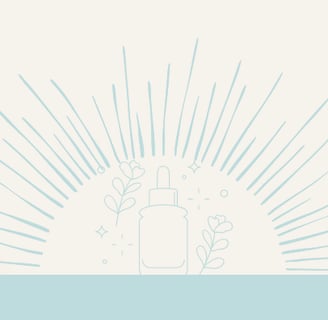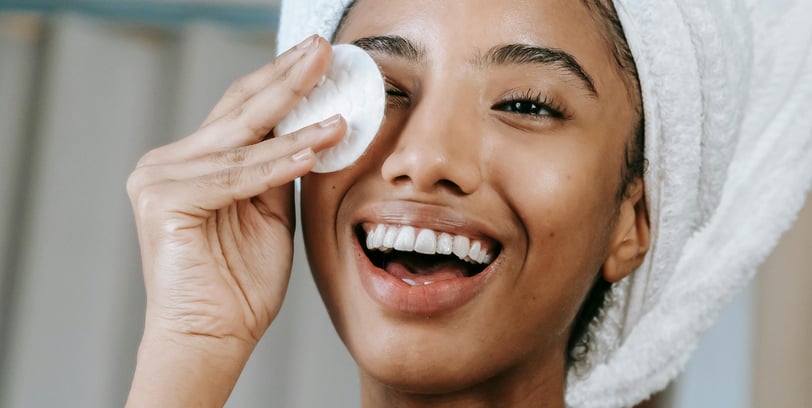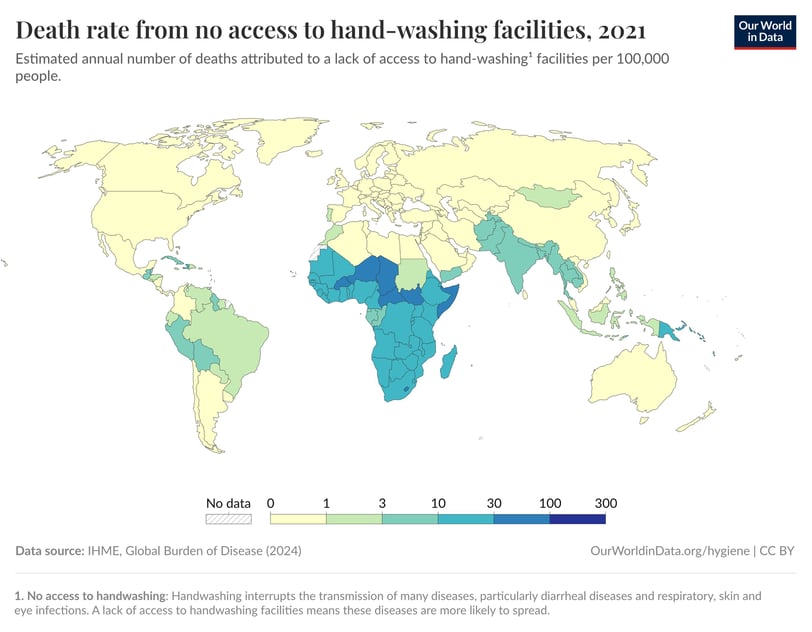

The Importance of Personal Hygiene
You know, I've always believed that wellness goes beyond just healthy eating and self-care rituals—it's also deeply rooted in the daily hygiene habits we often overlook. Keeping ourselves and our spaces clean doesn't just feel good; it's a powerful shield against illness.
Maintaining good personal hygiene is essential for preventing illness and promoting overall health.
By incorporating simple yet effective hygiene practices into our daily routines, we can significantly reduce the risk of infections and enhance our well-being.
Today, let's dive into why hygiene matters so much and the easy habits that can keep you (and your loved ones!) healthy and thriving.
💡 Things to take with you
Hygiene = Health
Clean habits help prevent illness and boost overall well-being.Wash Hands Often
20 seconds with soap cuts germs and illness risks significantlySneeze Right
Use your elbow or a tissue—not your handsHandle Food Safely
Wash, separate, cook, store food properly to prevent contaminationOral Care Matters
Brush and floss daily to protect teeth and lower disease risk
Why Does Hygiene Matter?
Good personal hygiene helps stop you from getting sick and prevents the spread of germs and infectious diseases. Germs that cause many diseases can be passed on by touching other people, handling contaminated food, or coming into contact with dirty surfaces or objects.
Understanding how infections are transmitted can help you avoid getting sick


Key Hygiene Practices to Prevent Illness
Getting sick doesn’t have to be part of your routine. A few small hygiene habits can go a long way in keeping you healthy—at home, at work, or on the go.
1. Handwashing Magic:
Did you know proper handwashing can reduce respiratory illnesses, like colds, by up to 21% and gastrointestinal illnesses by up to 31%? Source: Scary Facts About Handwashing
Always wash your hands for at least 20 seconds (the time it takes to hum "Happy Birthday" twice), especially before meals, after using the restroom, handling pets, or returning home from outside.
Be thorough—scrub your palms, between your fingers, under nails, and wrists. Handwashing is the single most effective way to prevent infections and stop the spread of germs.


2. Sneezing Etiquette:
A sneeze can launch droplets into the air at speeds up to 100 miles per hour, reaching distances as far as 6 feet and spreading thousands of germs in the process?
📋 11 Facts About Sneezes and Sneezing
To minimize this risk, always sneeze or cough into a tissue or your elbow—not your hands—to avoid spreading germs through touch. Immediately dispose of the tissue after use, and wash your hands right away to ensure germs don't linger.
These simple actions greatly reduce the transmission of airborne illnesses like flu, common colds, and even COVID-19: Elbow instead of hand: is it more helpful or harmful?


3. Food Safety First:
Every year, about 1 in 6 Americans gets sick from foodborne illnesses.
Contamination can occur at any stage, from production to preparation.
While we can’t control every point of contact, there are simple habits we can follow to lower the risk—starting in our own kitchens.
✦ Always wash your hands thoroughly before handling food.
✦ Ensure fruits and vegetables are rinsed under running water to remove
harmful bacteria and pesticides.
✦ Keep raw meats separate from other foods to prevent cross-contamination, and always cook meat and poultry to the recommended internal temperatures (for instance, 165°F for poultry) to effectively eliminate harmful pathogens like Salmonella and E. coli.
"A review of the published literature from 1960 to 2010 indicates a summertime peak in the incidence of illnesses associated with infection from a) Campylobacter, b) Salmonella, and c) Escherichia coli (E. coli)."
– Seasonality of Human Illnesses Associated With Foodborne Pathogens
✦ Proper storage of food at safe temperatures further prevents bacterial growth and foodborne illnesses.
Being proactive doesn’t mean overthinking—it means building smart, simple habits into your daily routine. With just a few intentional steps, you can protect your health (and your family’s) and enjoy your meals with more confidence and peace of mind.


4. Oral Health Wonders:
Regular flossing doesn't just prevent gum disease—it can also reduce your risk of heart disease by removing bacteria that can cause inflammation.
How amazing is that? Source: Flossing may reduce risk for stroke and irregular heart rhythm
Daily flossing removes harmful plaque and bacteria between your teeth that can lead to gum disease. Gum disease is linked to chronic inflammation, which may increase the risk of heart disease, diabetes, and respiratory illnesses.
To keep your mouth (and body!) healthy, floss daily, brush twice a day, and schedule regular dental check-ups.


5. Phone Hygiene:
Your smartphone can harbor up to 10 times more germs than a toilet seat!
(Here’s What to Do About It)
Phones frequently come into contact with various surfaces, including our hands and faces, making them a hotbed for bacteria and viruses.
Regularly cleaning your phone with disinfectant wipes significantly reduces the risk of infections, skin irritation, and breakouts. Aim to sanitize your device daily, especially if you're prone to acne or often touch your face.


6. Clean Sleep Zone:
We shed between 30,000 and 40,000 skin cells per minute—yikes!
These cells, combined with sweat, oils, dust mites, allergens, and bacteria, accumulate quickly on our bedding.
"The outermost layers of the skin are made up of dead skin cells. This is the normal structure."–says NYC-based board-certified dermatologist Hadley King, M.D.
Regularly changing and washing your sheets at least once a week reduces exposure to these irritants, helping to prevent allergies, skin irritations, and respiratory issues.
Keeping a clean sleep environment can dramatically enhance your sleep quality and overall well-being.
7. Stay Hydrated:
Staying hydrated supports healthy skin, aids digestion, boosts immunity, and can even help your body flush out toxins and germs.
Drinking water regularly also helps keep your mouth and throat clean, washing away harmful bacteria and viruses.
Source: 5 Ways Drinking Water Enhances Your Teeth and Oral Health
Aim for at least 8 glasses (about 1,5-2 liters) of water each day.
Keeping a reusable water bottle handy can encourage regular sipping and ensure proper hydration throughout the day.


8. Mind Your Makeup:
Expired makeup can harbor harmful bacteria that cause infections like conjunctivitis, styes, and acne breakouts.
⚠️ Mascara and other eye products should be replaced every 3 months, liquid foundations and concealers every 6 months, and powders annually.
Risks of using expired makeup by Mayo Clinic Health System
Additionally, regularly cleaning your makeup brushes and sponges—at least once a week—with mild soap or a dedicated brush cleaner helps prevent bacterial buildup, ensuring your beauty routine stays safe and your skin remains healthy and radiant


How to Practice Good Personal Hygiene Daily
Building healthy hygiene habits doesn’t have to be complicated—just consistent! Here’s how you can incorporate simple, effective practices into your everyday life:
🔎 Key insights
Wash Hands Often
Scrub with soap for 20 seconds—before eating, after the bathroom, and when coming home.Sneeze Smart
Use a tissue or your elbow—not your hands. Toss tissues and wash up after.Handle Food Safely
Wash produce, separate raw meats, and cook food to safe temps (165°F for poultry).Care for Your Teeth
Brush twice daily, floss once, and see your dentist regularly.Keep Bedding Clean
Wash sheets weekly to avoid buildup of skin cells, sweat, and allergens.Disinfect Your Phone
Wipe daily—it can carry more germs than a toilet seat!Stay Hydrated
Aim for 8 glasses a day to support your skin, digestion, and immunity.Clean Your Makeup Tools
Wash brushes weekly, toss expired products, and don’t share makeup.
Good hygiene isn’t just about staying clean—it’s one of the easiest ways to stay healthy, feel good, and protect the people around you. These quick habits add up fast, keeping germs away and helping you feel your best from morning to night. Simple, everyday care = long-term wellness wins.


Community Care Through Hygiene
Here's something I love: when we practice good hygiene, we're also caring for our communities.
Reducing the spread of germs means fewer illnesses for everyone around us. It’s a small act of kindness that contributes to everyone's wellness.
When everyone maintains proper hygiene, the spread of infectious diseases is minimized, leading to fewer illnesses and a healthier environment for all.
Incorporating proper hygiene practices into our daily routines is a simple yet powerful way to prevent illness and promote health.
By staying informed and vigilant about personal and environmental cleanliness, we can protect ourselves and those around us from various infections.
So let's keep it clean, lovely souls—your health will thank you.
--
Disclaimer: The information provided on the blog is for general informational and educational purposes only and is not a substitute for professional medical advice, diagnosis, or treatment. Consult with a qualified healthcare provider before making any health-related decisions
